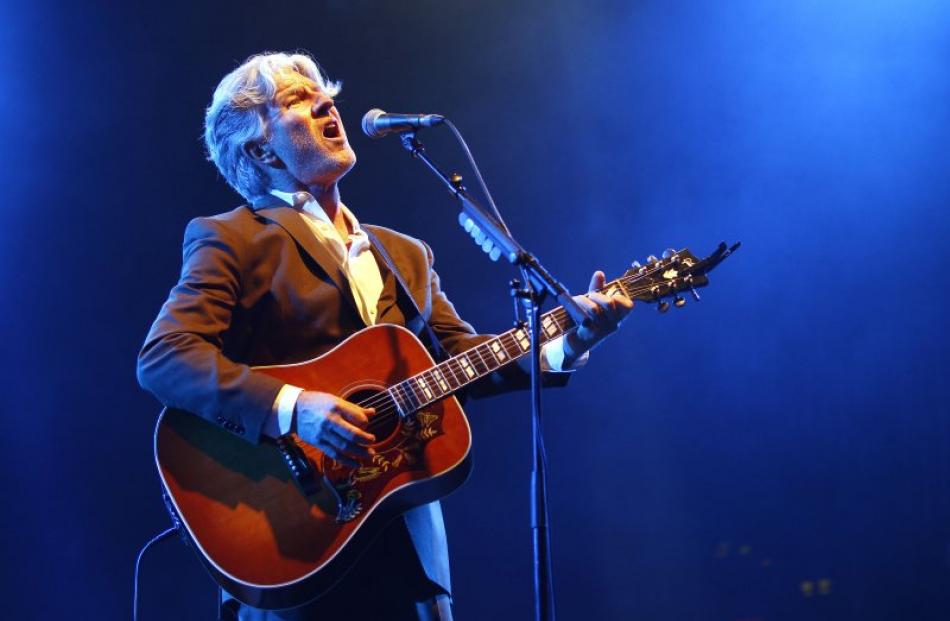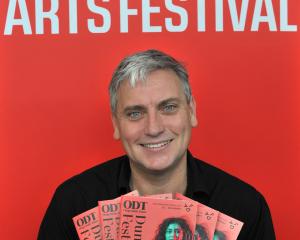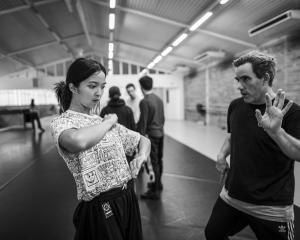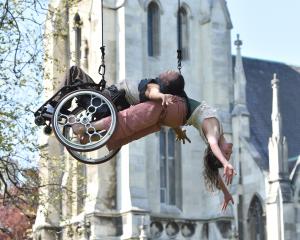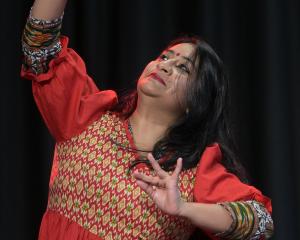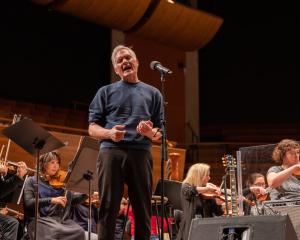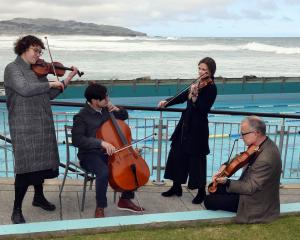Tim Finn's latest work is a personal, theatrical and, of course, musical reflection on what it means to be Pakeha in New Zealand. As the esteemed songwriter tells Shane Gilchrist, sometimes you have to look back to know who you are now.
In the New Zealand cultural fabric, Tim Finn occupies a status that's almost omnipresent, perhaps not dissimilar to a well-dressed, well-versed and well-mannered rogue who, having arrived first at a party and thumbed through your favourite albums only to leave them scattered on the lounge floor, is last to leave.
He's the guy who thinks before he speaks while others flitter through a modern landscape festooned with social media opportunities. Not for him the several-times-daily postings of dietary habits, gripes or knee-jerk reaction to someone else's news.
Want proof? Well, as of this week, his official Facebook page had most recently been updated in, erhm, April. Asked why his voice is so remarkably (and, arguably, refreshingly) thin in that context, Finn says he leaves his account to others to manage. Besides, there are other ways to communicate.
Finn is on the phone from his home in Auckland. He says it's been raining. But enough about the weather, even if he and younger brother Neil did co-write at least two hits (Weather With You and Four Seasons In One Day) on that very subject for Crowded House.
The topic is not even another solo album though, on the evidence of his last few, that would be welcome. Instead, the conversation is about Finn's latest project, White Cloud, described as a theatrical, sometimes impressionistic mix of stories and songs, which he uses to celebrate family, ancestors and what it means to be Pakeha in New Zealand.
This month, Finn will bring to the South a reworked, solo version of the concept (previously, it involved two actors, a six-piece band and various tricks of light), performing White Cloud at the Lake Wanaka Centre (as part of Aspiring Conversations) on October 11, the Glenroy Auditorium, Dunedin (as part of Arts Festival Dunedin), on October 17, and at the Oamaru Opera House on October 18.
Written by Finn and Ken Duncum, White Cloud also works in observation, photographs and journals and, in its latest incarnation, features a cinematic backdrop by Sue Healey.
Finn says he first heard about Duncum a decade or so ago when old Split Enz mate Mike Chunn mentioned Duncum's interest in writing a play based on a week in the early life of the formative New Zealand band.
''I responded through Chunn at that point, but Ken and I never met. About three years ago, I saw [Duncum's play] Horseplay, a fictional encounter between poet James K Baxter and writer Ronald Hugh Morrieson, a hilarious concept.
''I reached out and Ken was keen. He suggested we work on what we had in common in order that we'd be contributing and conceiving equally. And what we had in common was growing up in the North Island in the 1950s and '60s.
''It then became a matter of looking at old family stuff, photos you think you know inside-out. But when you drag them out and look at them in a new light, a whole new world opens up.
''Ken was on a writing fellowship in France and I was in Auckland so I'd sent him a song and he'd send back a poem and it grew organically without us being in the same room. It became a show that is about more than just our families.
''We expanded to include Pakeha identity without wanting to spell it out or come up with any conclusions necessarily. 'Immersive' is a word Ken likes to use to describe it.''
The original, larger White Cloud: Songs & Stories, had its premiere at Bats Theatre, Wellington, late in 2012.
''Dad (Richard) came to that, which was great. He's 92 now but my sisters took him down on the train [from Cambridge]. There were some tears and laughter, a lot of recognition and shared memories. It was great,'' Finn recalls.
''But I thought I'd make the show more mobile, so I could do it wherever and whenever I like. Thus it has become a one-man show. I tried that out at the Gaslight, this tiny theatre in Cambridge. In some ways it works better; it's more intimate.
''Originally, I wasn't in the larger version of the show. But I think it's better that I am.
''I have done the solo show a few times now, including at the Auckland Writers Festival and also at the Sydney Writers Festival [both were held in May]. It seemed to go over quite well there, so I think it is able to transcend the details.
''Sue Healey edited a beautiful film comprising dad's home movies as well as some of her own family stuff and that has become this great accompaniment to the text. Because it is 8mm and has no sound, it holds a certain magic.''
Finn's mother, Mary, who died in 2000, also comes into the frame.
While first contemplating the idea, walking down an Auckland street, Finn heard a ''wee tinkle'' on the pavement.
''I looked down and there was an Irish 20 pence coin. I thought that was mum's way of saying, `get on with it'.
''There is a lot of mum in the film, as well as the wider idea of mother - as in mother country. In some ways, I have dedicated this to my mum. There is a photo of mum on her honeymoon, standing in front of Mount Taranaki, which had a lot of resonance for me. I got a feeling of her as a real person with complex feelings.
''You take your family for granted and then, suddenly ... mum is no longer with us. Soon after she died I wrote a fragment of the song that became White Cloud, Black Shadow. That was years before this concept but you have to trust those things and follow them through.
''There are some darker sides to this piece. A lot of people are no longer with us, so there is a sense of remembering and honouring. There is this idea that we are here and gone.''
There are palpable connections between Finn's latest project and his musical output. On 2011 album The View Is Worth The Climb, various tracks wrestle with family, fatherhood and the notion of how memories can be distorted by time. Yet Finn says White Cloud is a departure in approach.
''I have worked a lot in first-person narrative in songwriting. This has a much broader context. I'm sort of channelling the ancestors so, in that sense, it's the least personal thing I have ever done. Yet, of course, mum is in there.
''I'm also reading memoirs, journals and letters from some of Ken's ancestors. And he's a fifth or sixth-generation New Zealander. I'm only a first-generation New Zealander. I barely know Ken, so there is a lot that is not personal at all.
''We go right back into the early-1800s, stuff that obliquely touches on aspects of our culture and personality. There is no satire or parody, but it's not always a look at the good stuff,'' he says, in reference to a section dedicated to the storming, occupation and dismantling of the peaceful Maori settlement of Parihaka by Government forces in the late 19th century.
It's a subject about which Finn has previously written: his 1989 single Parihaka (featuring reggae band Herbs), which reached the New Zealand top 10, was inspired by Dick Scott's book Ask That Mountain. Colonisation comes in other forms, too. Take, for example, the continuing filtering of American culture via television, film and music into New Zealand. Thus a concept such as White Cloud offers an opportunity to, if not bolster our sense of identity, at least reflect on aspects of it.
''I guess I do see this as a gift to give people,'' Finn says.
''I remember as a young man, I couldn't wait to get out and go. I was just interested in what lies ahead.''
If that sentence strikes a familiar chord, it's perhaps because Finn has put such adventuring sentiment to song before, 1982 Split Enz single Six Months In A Leaky Boat opening with, ''When I was a young boy/I wanted to sail around the world'', and continuing the theme: ''The tyranny of distance/Didn't stop the cavalier/So why should it stop me?''
Now, at the age of 62, Finn might still contemplate distant horizons, yet he is also interested in what has gone before.
''It is definitely part of having reached a certain age now, of where I'm at. There is a tenderness, a lovingness, in what I'm offering with this piece.
''It's about looking back to know who you are now,'' he explains.
''If your mother or father or grandparents are buried here, then this is your land.''
The show
Tim Finn performs White Cloud at the following venues:
Lake Wanaka Centre (as part of Aspiring Conversations), October 11
Glenroy Auditorium, Dunedin (as part of Arts Festival Dunedin), October 17
Oamaru Opera House, October 18

